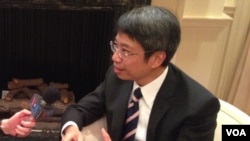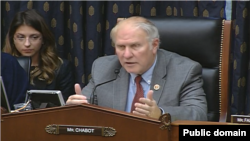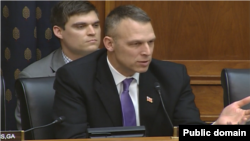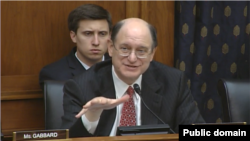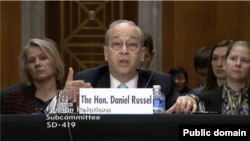WASHINGTON —
Members of Congress have said they are considering two courses of action in response to Hong Kong's pro-democracy 'Occupy' movement.
Protesting electoral rules
Hong Kong's top official in the United States says he has been lobbying the U.S. Congress to tread carefully on pushing for democratic reforms in the autonomous Chinese territory.
"I've been very active on Capitol Hill, calling on House and Senate members - particularly those on foreign affairs, trade and budgetary committees - to update them on Hong Kong issues, whether they are economic, political or human rights-related," said Washington-based Hong Kong Commissioner for Economic and Trade Affairs Clement Leung, in an exclusive interview with Voice of America last week.
"I've been very active on Capitol Hill, calling on House and Senate members - particularly those on foreign affairs, trade and budgetary committees - to update them on Hong Kong issues, whether they are economic, political or human rights-related," said Washington-based Hong Kong Commissioner for Economic and Trade Affairs Clement Leung, in an exclusive interview with Voice of America last week.
"We appreciate the lawmakers' concern and that their stated intention is to try to help Hong Kong, but our argument is that they could damage or harm Hong Kong before they could actually help us," he said.
We are sorry, but this feature is currently not available
Members of Congress have said they are considering two courses of action in response to Hong Kong's pro-democracy 'Occupy' movement.
Protesting electoral rules
Tens of thousands of Occupy activists blocked city streets from late September to mid-December in protest at Beijing's imposition of conservative electoral rules on the territory.
In House and Senate hearings on the Hong Kong protests last month, lawmakers who criticized Beijing's August ruling raised the idea of amending the 1992 U.S.-Hong Kong Policy Act under which Washington grants economic and other benefits to Hong Kong.
One lawmaker also said Hong Kong's request for its citizens to be granted U.S. visa waivers could be linked to the territory's handling of democratic reforms.
The 1992 U.S. law says Hong Kong's preferential treatment is contingent upon the territory being "sufficiently autonomous" from Beijing.
The 1992 U.S. law says Hong Kong's preferential treatment is contingent upon the territory being "sufficiently autonomous" from Beijing.
In the hearing of the House Subcommittee on Asia and the Pacific, chairman Steve Chabot said "it may be time to reassess" that status and the benefits that come with it, considering what he called Beijing’s "orchestration" of the Hong Kong government’s responses to the Occupy protests.
Hong Kong authorities dismantled the city's three Occupy protest camps after a series of violent confrontations involving police, pro-democracy protesters and anti-Occupy activists.
Leader backs Beijing
Leader backs Beijing
Hong Kong Chief Executive Leung Chun-ying also rejected the Occupy movement's demand for the public to nominate candidates for the city's next chief executive in a 2017 direct election, saying that would violate the Chinese government's ruling that candidates must be vetted by a traditionally pro-Beijing nominating committee.
Commissioner Leung criticized U.S. legislation that would require President Barack Obama to make annual certifications that Hong Kong is "sufficiently autonomous" - a proposal that would change the 1992 law, which only mandates presidential action if Hong Kong is deemed to have lost that status.
"This annual requirement is more onerous than the current system," Leung said. "It would make Hong Kong more vulnerable to uncertainty in U.S. domestic politics and the ever-changing U.S.-China relationship. So we are trying to work very hard to convince members of Congress and their staff that this may not be a good idea."
Another participant in the House hearing, Scott Perry, suggested passing legislation to make Hong Kong eligible for the U.S. visa waiver program as a way of making a "difference" to the territory's political situation.
Leung said Hong Kong is lobbying "very hard" for U.S. visa waiver privileges for its passport holders and believes the issue should be "separated" from the ongoing dispute about democratic reforms.
"From our point of view, the U.S. visa waiver program is a very strong tool to strengthen two-way communication and interaction between Hong Kong and the United States," Leung said.
Representative Brad Sherman told the House hearing that he opposes a visa waiver for Hong Kong, given what he called the poverty of some of the territory's residents.
"We can't create a circumstance where anybody who can get a Hong Kong passport gets right into the United States," he said.
Leung said Hong Kong people do not pose an immigration risk to the United States in the way that other groups of people do.
"But we know that the road to giving Hong Kong people U.S. visa-free treatment is long, because immigration is still a very sensitive subject in the United States," Leung said.
The Hong Kong diplomat declined to comment directly on the Obama administration's responses to the Occupy movement.
US positioning
U.S. officials initially emphasized a position of neutrality, saying they "do not take sides in discussions of Hong Kong's political development, nor do we support any particular individuals or groups involved in it."
The Hong Kong diplomat declined to comment directly on the Obama administration's responses to the Occupy movement.
US positioning
U.S. officials initially emphasized a position of neutrality, saying they "do not take sides in discussions of Hong Kong's political development, nor do we support any particular individuals or groups involved in it."
The White House also has tried to discourage Congress from acting to pressure the Hong Kong government.
U.S. Assistant Secretary of State for East Asian and Pacific Affairs Daniel Russel told last month's Senate hearing that any amendments to the 1992 U.S.-Hong Kong Policy Act should not "undermine the principle that Hong Kong is autonomous."
But following lawmakers' accusations that the Obama administration was not showing enough solidarity with the Occupy protesters, Russel used the hearing to strengthen the administration's criticism of Beijing and support of the demonstrators' democratic aspirations.
Russel said Beijing's election ruling "falls very far short of the aspirations of the people of Hong Kong" and "could and should have gone much further" to enable universal suffrage.
He also said the legitimacy of the chief executive will be "greatly enhanced" by a "credible" election that allows a "free expression of choice by the voters to select from among competing points of view, not simply from ... three identical, handpicked candidates."
Asked if those remarks amount to "interference" in Hong Kong affairs -- something the territory's leader has vocally opposed -- Commissioner Leung said Hong Kong is "very divided" on constitutional reform.
"At the end of the day, it has to be the Hong Kong people, the government and Beijing who have to resolve the issue among ourselves," he said.
